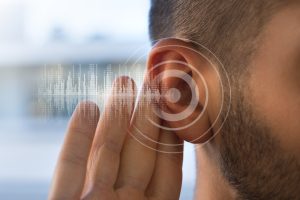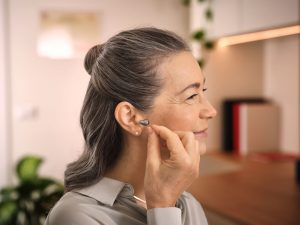
TREATMENT OF HEARING LOSS
Treatment of hearing loss. Everyone can be affected by hearing loss, from infants to adults in their 60s and 70s. Hearing loss can be caused by a variety of factors, but high noise exposure is the most common cause. Surgery to cure certain problems can enhance hearing, but hearing loss cannot be restored. Hearing loss can be lessened by devices such as hearing aids.
TREATMENT OF HEARING LOSS
A partial or complete incapacity to hear, known as hearing loss, can affect one or both ears and range in severity from mild to severe. It may be acquired later in life or present from birth. Communication, social engagement, and general quality of life are all greatly impacted by hearing loss. When your hearing system. is impacted, you develop hearing loss. You could find it difficult to follow, comprehend, or take part in conversations if you have hearing loss. You can find it difficult to follow dialogue on television, participate in online meetings, or hear phone calls.
Types

Conductive hearing loss: This type of hearing loss occurs when anything blocks sound from traveling through the middle ear or outer ear.
Sensorineural hearing loss: This type of hearing loss develops over time as a result of injury to the inner ear. Sensorineural hearing loss rarely occurs rapidly. This is sudden deafness, often known as sudden sensorineural hearing loss. SSHL might occur over a few days or all at once.
Mixed: This occurs when you have problems with both your inner ear (sensorineural hearing loss) and middle or outer ear.
Signs

Frequently, you ask others to repeat themselves.
Particularly while speaking on the phone or in a busy setting like a restaurant, you find it difficult to follow a discussion.
People are murmuring, you thought.
Birdsong and other high-pitched sounds are inaudible.
You must increase the volume on your tablet, computer, or television.
Your ears are ringing, a condition known as tinnitus.
You’re experiencing ear pain.
You have the sensation that your ear is filled with fluid or pressure.
You’re dizzy or have trouble balancing.
Causes
The accumulation of earwax in your ear.
fluid from allergies or colds in your middle ear.
Otitis media, or middle ear infection.
(Otitis externa) swimmer’s ear.
Fluid is trapped in your middle ear due to eustachian tube problems.
eardrum rupture.
malignancies of the ears.
Your ear is trapped with something. For instance, if your child is served peas as a side dish, they might choose to stick one in their ear.
The development of a baby’s middle or outer ears might be impacted by congenital abnormalities.
Treatment

Hearing loss caused by conductive
antibiotics and other medications used to treat ear infections.
procedures such as tympanostomy to place ear tubes, tympanoplasty to repair a perforated eardrum, or surgery to remove tumors.
methods for clearing out debris from your ear canal, such as earwax.
Sensorineural hearing loss
drugs that lessen cochlear hair cell swelling, such as corticosteroids. (Excessive noise exposure can harm the hair cells in your cochlea.)
treatment such as cochlear implants and hearing aids.
Summary
If you believe you have hearing loss, consult a healthcare professional or audiologist who will determine the best course of action to improve your hearing. Temporary hearing loss is possible, but many people experience permanent hearing loss, which can make you feel as though you’re missing out on life, make it difficult to carry on phone conversations, or make you feel frustrated when you can’t enjoy your favorite shows or movies.